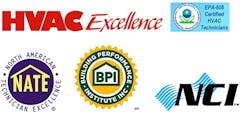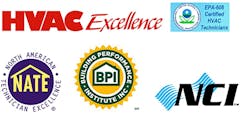Certifications earned are evidence that you continue to grow in your career. We chose a profession where much of our training is received while we earn in the field, not while we pay at a university. Let's take a look at the value we place on those documents we hang on the wall as evidence that we strive to climb higher in our profession.
Advancement in your career is often marked by the continuing education you complete. Earned certifications include a document that attests to a new skill or competence you began developing through specific training. It is proof you took a step toward advancement.
Speak with successful people who received a degree or earned a certification, and they will enjoy telling you a story about their struggle to get and keep a job. If you let them, they'll go on to explain the continuous work required to earn success in their chosen field.
However, training itself is only the beginning. It takes time, further study, and practice to fully develop your knowledge into a talent that you can use at will.
What do certifications mean to you? The answer rests in what you do with the newly gained knowledge.
More than a Career Launch
Colleges, universities, and some trade schools market themselves as a promise to prepare you to springboard into a top paying job. In other words, they promise you will reap the fruits of your diploma forever. Well, that's not an accurate representation of what they deliver. The same is true for HVAC certification training.
Speak with successful people who received a degree or earned a certification, and they will enjoy telling you a story about their struggle to get and keep a job. If you let them, they'll go on to explain the continuous work required to earn success in their chosen field.
Ongoing learning and commitment are required to excel in a long-term career.
Twelve Jobs in Your Lifetime?
In 2015 the U.S. Bureau of Labor Statistics published a study to identify the number of jobs a person has between the ages of 18 to 50. The study found the typical person held 12 jobs in 32 years or had a job change every three years or less.
For you, does that mean you'll be getting a new job every three years? I hope not.
It's not unusual to change companies as you grow and develop in the first few years of your HVAC career. If you're fortunate, you'll seek and find a company interested in helping you build your career and investing in your abilities. They do this because they see your commitment and performance. That leads them to believe in your potential.
Some advancements you earn over the years may result in a change in your job. Your designated position or title may or may not change, but your job will. Through this lens, count the number of jobs you've had in your career.
Skills Drive Our Economy
The skills you choose to develop are the power that drives today's economy. Most importantly, your skills drive your economy, which is the most important economy in the world today. Isn't it?
Ideally, you'll be rewarded with recognition, leadership, and related opportunities for advancement, including increased income when the time is right. The application of new skills in today's economy generates new income. A portion of new income fuels the company and will soon be shared with you.
Every certification you earn and learn to apply increases your worth. Some may function as a new tool on your belt. Others may result in a complete shift in the direction of your career. How great a change depends on your ability and passion for putting it to work.
If you're fortunate to be with a great company, advancement will come from that company. If not, the opportunity you desire and work for is not far off in your future and may be in another place.
You advance when you outgrow your current position. It happens when you can no longer hide your desire. Perceptive people recognize and hear your desire to advance and often are eager to encourage the deployment of your skills.
As an employer, what steps do you take to ensure the certifications you pay for are applied by the training recipients? Do you reward people for earning the certification? Or do you reward them when they correctly apply their new knowledge on the job?
Not Knowledge, But Action
An English philosopher named Herbert Spencer (1820-1903) once said, "The great aim of education is not knowledge but action." The value and worth you place on your certifications depend on how much you put them into action.
Training HVAC professionals for more than 25 years rewards me because I can follow the careers of many who diligently applied what they learned. They often favor me with news of remarkable solutions they came up with, projects they completed, companies they built, and successful retirement accounts they amassed. Although they credit the initial learning we provided as the source of their success, we know they are the real heroes because they took sustained actions as they developed their professions.
We've all heard about well-educated Ph.D.'s working at fast-food restaurants. You can find the same thing happening in our industry. Knowledge is of little value without action.
What Do Your Certifications Mean to You?
There's a wise quote by American philosopher Henry Thoreau. He wrote, "What you get by achieving your goals is not as important as what you become by achieving your goals." The value you place on your certifications depends on what you become as you develop the associated skills and talents launched by your certifications.
What certifications are on your wall? Please take a close look at them and consider how much more you've developed your knowledge when you earned them. If there's one certification that stands out, New Year's resolutions are right around the corner.
Rob "Doc" Falke serves the industry as president of National Comfort Institute, Inc., an HVAC-based training company and membership organization. If you're an HVAC professional interested in receiving information about certifications available, contact Doc at ncilink.com/ContactMe or call him at 800-633-7058. Go to NCI's website at nationalcomfortinstitute.com for free information, articles, downloads, and current certification opportunities.
About the Author
Rob 'Doc' Falke
President
Rob “Doc” Falke serves the industry as president of National Comfort Institute an HVAC-based training company and membership organization. If you're an HVAC contractor or technician interested in a building pressure measurement procedure, contact Doc at [email protected] or call him at 800-633-7058. Go to NCI’s website at NationalComfortInstitute.com for free information, articles and downloads.

